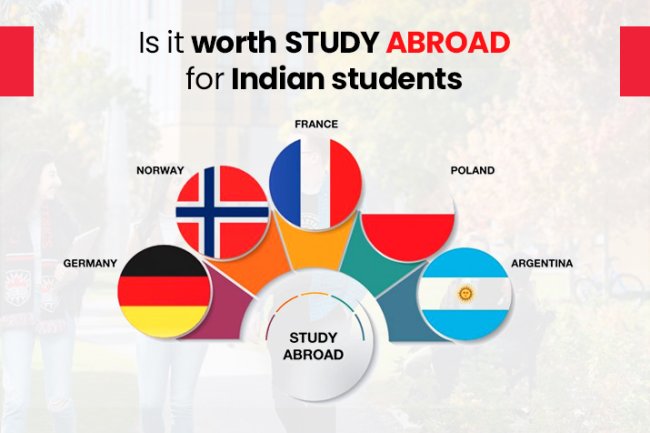Top 11 Myths about Study Abroad
There are many myths about studying abroad, but here are some of the most common.

Are you interested in delving deeper into and examining your motivations for studying abroad? Would knowing the reasons other students choose to study abroad be helpful?
You want to study abroad because... To begin with, it has always been at the top of your list of things to do. Even though you know that moving to a foreign nation is not easy, the additional advantages you know will result from pursuing education abroad frequently surpass your doubts.
Selecting a University is a crucial stage in the journey for any ambitious young person. Information is vital for students who will be studying abroad. To provide you with all the necessary knowledge, we make an effort to dispel 11 common misconceptions about studying abroad. These come from the first-hand accounts of University Bureau students who travel abroad to study each year.
#1 It’s Not for Me
Studying abroad is the best option for you if you want a promising career. We advise you to apply to a foreign university if you want to pursue a high-quality education with qualified teachers and options for additional study in the area of study of your choice.
Studying abroad is the key to success for people hoping to advance personally in a different nation. You can also have the experience of a lifetime, which will help you grow and grant you the independence you require.
Your biggest motivation to study abroad will always be the great quality of education. Although there are many top universities in our country, they are unquestionably inferior to their counterparts in nations like the UK or the US. International universities have access to the facilities, connections with businesses, and funding that made their education brand so well-known in the first place.
You simply want to absorb the best knowledge possible. Not only is it a once-in-a-lifetime experience, but studying overseas at a prominent university also guarantees a better future for you and your profession.
#2 Just the Olympics go Abroad
The prerequisites of international universities frequently deter young students. Although the admissions process is challenging, faculties address all applicants, not just those with excellent grades, and focus on those with the openness and aptitude to pursue the selected subject of study.
The likelihood of admission to a university outside the country increases with an average of 8 or 8.50 in the previous study cycle. Team at university bureau also dealt with students from less privileged families, but only after they were able to convince the evaluation committee of their sincere intention to pursue their education abroad.
The grades earned in the courses pertinent to the academic field of choice are another important consideration in universities. In other words, a young student interested in studying IT, for instance, will have their performance evaluated more rigorously than that of human beings.
Additionally, several UK universities may accept prospective students with English language proficiency ratings of B2. This is for students who struggle to perform well on the Cambridge, IELTS, or TOEFL standardized language exams.
The UK also offers the Foundation Year program for students who do not have a strong command of the English language or who do not pass their final test with a passing grade. This chance provides one-year courses that are regarded as preparatory for the individual who enrolls as a student after finishing the Foundation Year without needing to be admitted again.
International study programs are made for any kind of learner willing to enroll. All individuals interested in attending an international institution are encouraged to apply because studying abroad offers the chance to specialize.
#3 It’s Hard to Choose the Destination
Selecting a country is another crucial choice you must make if you intend to study abroad.
You should consider where you want to live in the upcoming years. You should fit with the country in terms of personality. The decision is pretty simple after determining what you want from the "adoptive country." If you're unsure about what academic path to take or which industry is best for you, throw an eye.
Once you have completed this process, our team will be happy to offer you free guidance as you proceed with your application. We have partnerships with more than 100 universities in Europe. Our counselors have experience with more than 1,000 applicants each year who currently attend or have attended an International University.
In this blog, you can always find the answers to your queries, and with the aid of Univerity Bureau's Journal, you may virtually tour the campuses of our partner universities with our counselors.
#4 It’s Expensive
People in the nation are referring to the national economy and believe studying abroad will cost much money.
You should be aware that while there are several nations in Northern Europe (Finland, Sweden, and Denmark) where education is entirely free, in the other countries where there are tuition costs, any young person is given assistance to pay for their education.
Most foreign nations offer government loans to overseas students to assist them in fully covering their tuition costs. For instance, the Student Loans Company in Great Britain provides government loans of approximately £ 9,250 for undergraduate education and £ 10,609 for master's degree programs.
On the other hand, the Netherlands is far more affordable from a study standpoint, with a beginning tuition charge of 2.078 Euros per year.
In some nations, there is also a potential for students to earn scholarships for up to €2,000, which might support them and lower their daily expenses.
#5 The Process is Complicated
Foreign university admission standards are pretty easy as comparable to those in Romania or Greece.
A score of more than 8 on the final exam or the Bachelor's Degree, a letter of motivation, one or more letters of recommendation, a certificate, and proof of a good grade earned in an internationally recognized English language test is the documents that are generally required in the form of a file for all faculties (CAE, IELTS, TOEFL). Some universities will also accept the B2 mark you received in baccalaureate English as part of the test.
Additionally, Foundation Year programs allow you to study abroad even if there is no final exam or if you don't have advanced English language skills. You can contact us at universitybureau.com for more information about this opportunity.
Any person who is eager to study abroad can simply fulfill these prerequisites. Although uncommon, some faculties may require particular language or aptitude examinations. However, our team will offer these situations to you. Send us a mail at support@universitybureau.com if it appears complicated; we are only a click away.
#6 I’m not Ready
Any young person deciding to travel overseas must do so carefully. Young age and geographical distance from family or friends are two reasons why many people second-guess their choice to pursue a degree abroad.
However, these issues do not deter people eager to attend a prestigious university while studying abroad. How much they desire to have the adventure of a lifetime will determine everything.
There aren't many years of study, and you get several weeks of vacation every year, just like in Romania or Greece, so that you can visit your family. Furthermore, if you opt to take a flight these days, you can get home in less than 2-3 hours.
Anyhow, once the studies have started, your focus will be on the course material. Thus your homesickness will soon pass. You will make new acquaintances and know that college friendships will likely endure a lifetime.
#7 I do not know the Quality of the Program
A recent study with University Bureau students as the subjects found that international education systems are more performance-based and student-centered. Each topic of study is well-trained for teachers, and they have open communication with the pupils.
Universities abroad provide a greater emphasis on hands-on learning, flexible timetables, and topic options.
Additionally, there are more options than in Greece for work or enrollment in internship programs, and these opportunities can still arise while you are still a student.
Over 90% of graduates from most UK universities are employed within six months of graduation.
International universities have many relationships with other colleges on all continents to complete the advantages package brought abroad, so you can always go study in that exotic place you've always dreamed of for a semester or a year through Study Abroad / Exchange programs.
#8 I will not Adapt Abroad
Living abroad will be your most beautiful experience if you are open-minded and want to experience different cultures and meet new people. Typically, coworkers, universities, or associates assist international students in integrating seamlessly right away.
Universities will at least ensure that your time on campus is enjoyable by providing one or more of the following option:
Buddy program, Welcome Week, or access to the International Office.
During the first week on campus, overseas students can attend a variety of events during welcome week. Discover the campus, get to know the professors and your new friends, and learn about the student organizations you can join by volunteering. Additionally, a lot of theme parties will be planned, and you can learn which supermarkets, banks, and other financial or medical services are the most reasonably priced.
An older student who has gone through the same experience as you may serve as your buddy or the person the institution assigns to you to mentor you in your first year. It can ease social or cultural change or culture shock. You can rely on this individual in any circumstance since they will be able to relate to what you are going through.
Each university has a team dedicated to resolving issues affecting international students in its international office, career center, or student union. This includes volunteers who can help you with any questions or issues you have while staying with us, as well as career counselors, psychologists, and others.
As a result, because everyone who studies in that program shares the same hobbies and objectives, you will inevitably create ties with other classmates, and your closeness will be very simple to develop. Your ability to adjust to your new life will be facilitated by the friendships you made in college, making this experience the one you will never forget.
You also want to study abroad because you'll be able to expand your vocabulary and gain confidence by learning a new language.
Even in a million years, you never imagined that you would be able to speak a language other than English fluently. As a result, when you was able to read, write, and speak Swedish, it made you feel incredibly proud and accomplished since it meant that all of your hard work had finally paid off.
#9 International Students are Treated Differently
In actuality, there is no distinction or marginalization of international students in any form. Courses encourage student interaction and conversation, making it simple for international students to meet new people and share their culture and traditions with others.
Due to their emphasis on multiculturalism, social inclusion, tolerance, and promoting culture and learning about the traditions of each country their students are from, most foreign institutions have sizable international student populations.
International students are treated, appreciated, and educated like domestic students at any university abroad. There are no cultural distinctions in education, and if you are a student who performs well in class and earns good grades, you will be valued regardless of where you are from.
International students can at any moment gain help and counseling for the future or while they are studying, just like young natives can. They all have an equal probability of receiving a study or work offer and an internship from significant corporations.
#10 You do not know what career options, you have after Graduation
For instance, the percentage of graduates working in the field they studied within the first six months following graduation is one of the standards for UK institutions.
95.7 percent of University of Northampton graduates can start their careers immediately.
Without a doubt, studying abroad is akin to having a young man's skills certified internationally. The knowledge gained during the academic years and the final diploma pave the path for a European and global career, regardless of whether we are referring to Anglo-Saxon higher education or the research universities in the Netherlands.
Post-graduate work options are not just restricted to the nation where the university is located but also span the Western region, given the international milieu of the years of study.
Greek graduates frequently land employment overseas that requires them to move to another nation, a big European city, or even back to Greece.
#11. "Employers don't value International Experience."
Think again. 60% of respondents to the 10,000 hiring managers and CEOs across 116 countries QS Global employer survey indicated that they "value a foreign study experience."
Studying abroad can make you stand out from other applicants and give you the opportunity to acquire transferable skills that are beneficial for thriving in the job, such as ingenuity and adaptability, as well as cultural sensitivity and language abilities.
Conclusion
When you study abroad, you are pushing yourself to encounter new things and learn from them. However, you shouldn't let your lack of language proficiency when you first move there, stop you from making this crucial choice. Once you get there, you could even be surprised at how quickly you pick up common phrases and vocabulary, and before you know it, you'll feel entirely at home in your new place.
Don't be concerned if classes are taught in a foreign language. The preferred language for foreign education is now English. However, be sure there are no language barriers before applying by looking over the course requirements.
To assist you in becoming more accustomed to popular vocabulary and phrases, you might also try enrolling in programs in language other than Englsih.
Actually, studying abroad is a fantastic way to broaden your social network and meet new people. Numerous other students will show up alone and will be just as anxious to make new acquaintances. The majority of study abroad programs also host orientation events to promote networking. Studying abroad brings people together and frequently forges lifelong friendships.
Studying abroad can actually be extremely economical with a little extra effort and intelligent planning (or even free). There is always the option of applying early for financial aid (Pell grants, etc.) and looking for scholarships, many of which are exclusively available to students studying overseas.
Examine these suggestions for additional funding for study abroad:
- Consult the office for study abroad at your university beforehand. The employees there will be knowledgeable about the most recent scholarships and grants available to support your study abroad adventure.
- Get online. You can also contact univerity bureau’s financial officer and is a great place to look for a study abroad financial aid online.
- Fill out a Gilman International Scholarship application. Numerous applicants who are accepted earn this scholarship.
- Check the country's official website before you depart to study abroad.
- Take a deep breath; you won't be thrust into a nation devoid of guidance and organization. The study abroad experience is often quite planned, despite the fact that you might be expecting chaos.
Students will have predetermined classes they must take, prearranged vacations and outings, and, of course, a supportive faculty to draw on. This is the ideal chance to immerse yourself in another culture, discover a wealth of fresh information, and benefit from the complete assistance of a study abroad program.
Numerous study abroad programs provide a variety of housing alternatives, including living in university residence halls, flats, or with a host family. The decision is entirely up to you, although each offers advantages and disadvantages.
Students who live in dorms or apartments will have roommates who are either full-time university students or are studying abroad alongside them. Another choice is to stay with a local host family, which is recommended if you're serious about learning the language. If you're worried about being all by yourself, many families will take in more than one student.
Uniplaces offers a selection of student homes if you'd prefer greater freedom in your housing search. Or, if you're searching for a more distinctive experience, try using Homestay. Additionally, if you want to travel frequently, you can search for hostels on websites.
To ensure student safety, every study abroad program that is available to students has undergone a comprehensive review. You may be confident that if there were any real damage to the well-being of pupils, governments and academic institutions would forbid the program. However, there are still inherent risks associated with studying abroad, so you should still use common sense and heed your gut feelings.
A disclaimer of obligation may still be requested of you, but this is a routine procedure for any international trip. The majority of programs also provide a crash education in city navigation and safety. You'll be all right if you heed this advice.
Enjoy your time studying abroad
Good news: You can study abroad in any major! Just do some research on the course alternatives that various programs have to offer. While some colleges strongly emphasize specific majors, others offer a wide variety of course options. Students of any major can study abroad thanks to several programs' wide variety of courses.
Have no fear, Team University Bureau is here!
These are only eleven of the misconceptions we have discovered about studying abroad in the two years since we began providing free counseling to anyone who wants to pursue an education overseas.
We encourage you to ask us any questions you may have, because proper information gathering is the first step to a successful higher education abroad.
You can get free assistance from us with your application. Simply email us at support@universitybureau.com to get started!
What's Your Reaction?





















